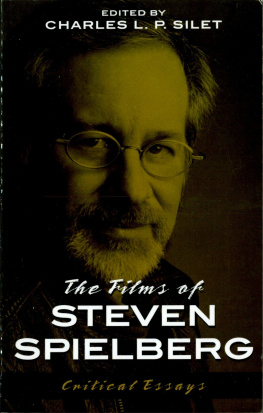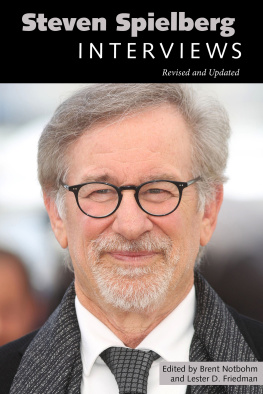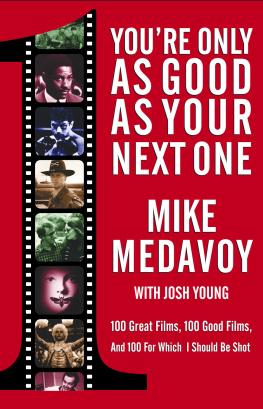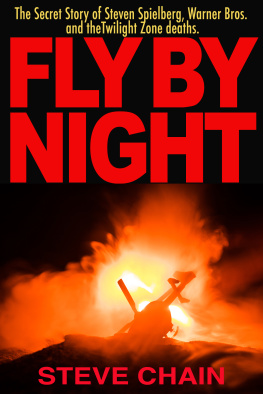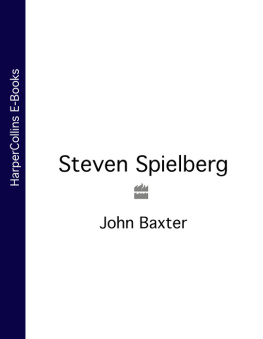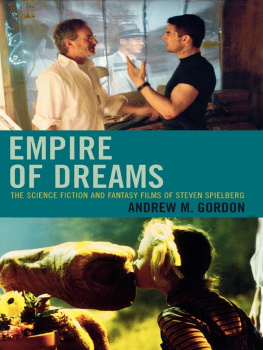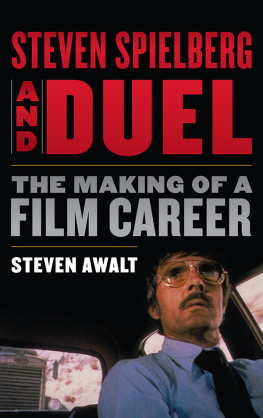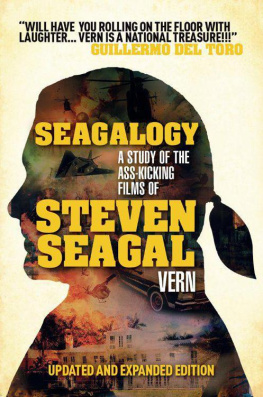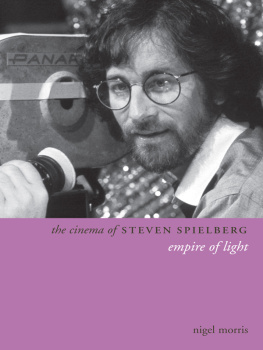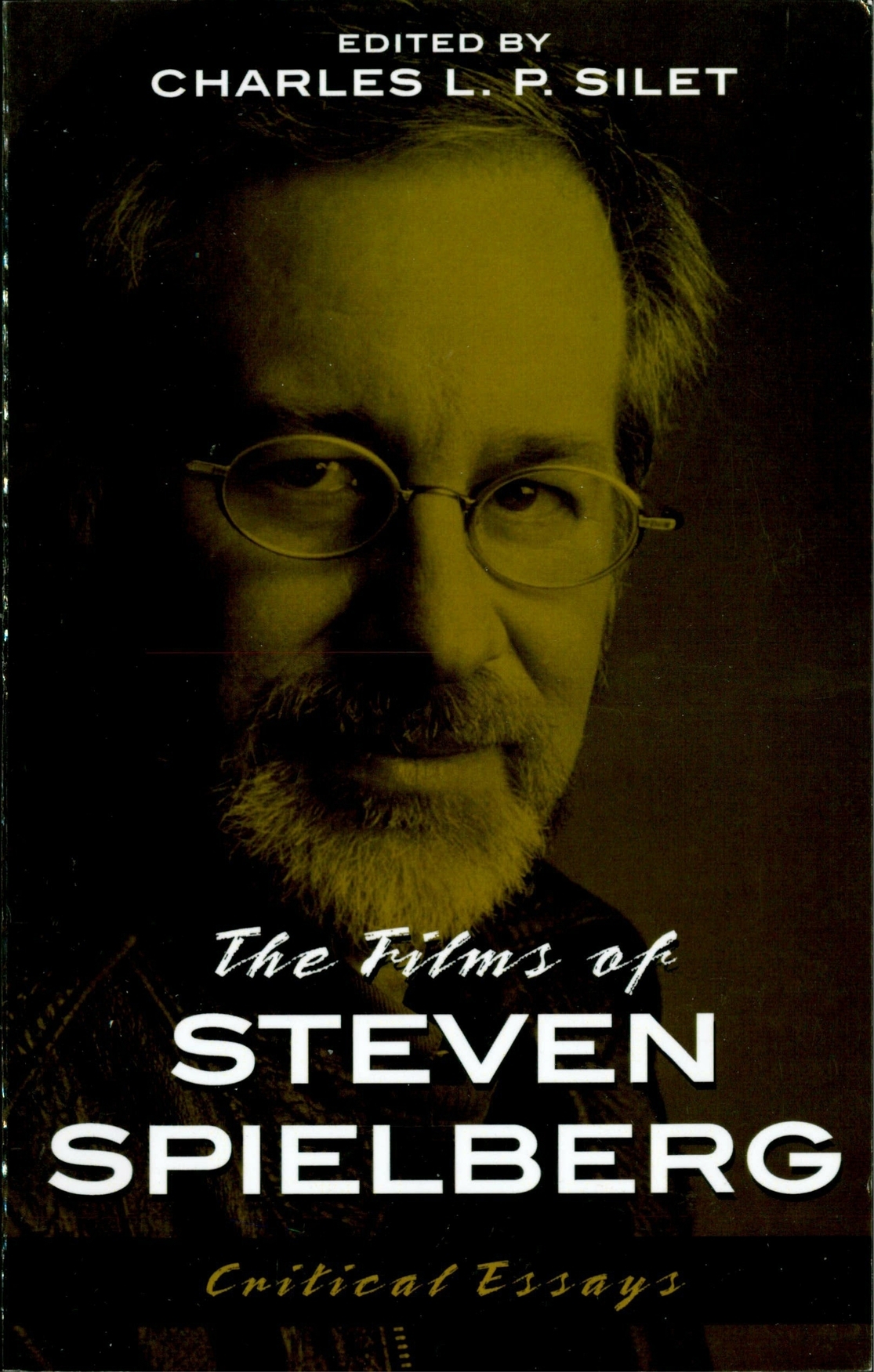Acknowledgments
I wish to thank the following individuals for their generous help in preparing this project: Thomas Kent, Chair, Department of English, Iowa State University and Elizabeth Beck, Director, Honors Program, Iowa State University for funding research assistance; Cavan Regan and Angie Anderson for all of the good work that they did as my research assistants; and Sheryl Kamps, who cheerfully and patiently worked to produce the camera-ready version of the manuscript; and Scott Silet, research librarian extraordinaire, who can find anything and who from time to time helps out his old man.
I would also like to thank the editors at Scarecrow Press of Rowman & Littlefield Publishing Group, especially Amanda Rudisill, Anthony Slide, and Rebecca Massa, for their meticulous editing of the manuscript and their many good suggestions which made this book all the better.
I also want to thank the students in the Honors Seminars I have taught on Steven Spielberg for the past five years who have shared their ideas about the director and his films with me and were instrumental in aiding me in the choice of the essays included in this volume.
As always I wish to acknowledge the emotional and intellectual support given me by my wife, Kay. The dedication to her of this volume in only the smallest of ways suggests the value of her in all of my projects.
Finally, I wish to express my gratitude to those authors and editors who so graciously gave me permission to reprint their work in this collection.
Jonathan Lemkin, Archetypal Landscapes and Jaws from Planks of Reason: Essays on the Horror Film, edited by Larry Grant (Lanham, Md.: The Scarecrow Press, 1984). Reprinted by permission of the publisher.
Thomas S. Frenz and Janice Hocker Rushing, Integrating Ideology and Archetype in Rhetorical Criticism, Part II: A Case Study of Jaws, The Quarterly Journal of Speech 79 (1993), 61-81. Reprinted by permission of The Quarterly Review of Speech.
Charlene Engels, Language and the Music of the Spheres: Steven Spielbergs Close Encounters of the Third Kind, LiteraturelFilm Quarterly 24:4 (1996), 376-384. Reprinted with permission of the LiteraturelFilm Quarterly Salisbury State University, Salisbury, Md. 21801.
Lane Roth, Raiders of the Lost Archetype: The Quest and the Shadow, Studies in the Humanities 10:1 (June 1983), 13-21. Reprinted by permission of Studies in the Humanities and the author.
Ilsa J. Bick, The Look Back in E.T., Cinema Journal 31:4 (Summer 1992), 25-41. Copyright 1992 by the University of Texas Press. All rights reserved.
Gerald Early, The Color Purple as Everybodys Protest Art, The Antioch Review 44:3 (1986), 261-275. Copyright 1986 by the Antioch Review, Inc. Reprinted by permission of the Editors.
Andrew Gordon, Steven Spielbergs Empire of the Sun: A Boys Dream of War, LiteraturelFilm Quarterly 19:4 (1991), 210-221. Reprinted with permission of Literature/Film Quarterly Salisbury State University, Salisbury, Md. 21801.
Frank Gormlie, Ballads Nightmares/Spielbergs Dreams: Empire of the Sun, Cinema and Fiction: New Modes of Adapting, 1950-1990. Edited by John Orr and Colin Nicholson. Edinburgh, Scotland: University of Edinburgh Press, 1992. Pp. 140-150. Reprinted with permission of the University of Edinburgh Press.
H. R. Greenberg, Raiders of the Lost Text, Journal of Popular Film and TV 18:4 (1991), 164-171. Reprinted with permission of the Helen Dwight Reid Foundation. Published by Heldref Publications, 1319 Eighteenth St., NW, Washington, D.C. 20036-1802. Copyright 1991.
Patricia Pace, Robert Bly Does Peter Pan: The Image of the Child as Father to the Man in Steven Spielbergs Hook, The Lion and the Unicorn 20 (1996), 113-120. The Johns Hopkins University Press.
Stephen Jay Gould, Dinomania, The New York Review of Books, August 12, 1993, pp. 51-56. Reprinted with permission from The New York Review of Books. Copyright 1993 NYREV, Inc.
Kirby Farrell, The Economies of Schindlers List, Arizona Quarterly 52:1 (Spring 1996), 163-188. Reprinted from Arizona Quarterly 52:1 (1996), by permission of the Regents of The University of Arizona.
Ora Gelly, Narrative and the Embodiment of Power in Schindlers List, Film Criticism 22:2 (Winter 1997-1998), 1-26. Reprinted with permission of Film Criticism.
Gary Rosen, Amistad and the Abuse of History, Commentary 105:2 (February 1998), 46-51. Reprinted from Commentary, February 1998, by permission; all rights reserved.
Louis Menand, Jerry Dont Surf, The New York Review of Books, September 24, 1998, pp. 78. Reprinted with permission from The New York Review of Books. Copyright 1998 NYREV, Inc.
The Directors Filmography
Steven Spielbergs film credits are truly impressive. Beyond his work as a director, he has served as a producer, both credited and uncredited, for scoressomewhere around 140of projects ranging from feature-length films to television series, episodes, movies, and documentaries. He has also appeared both as an actor and as himself in almost fifty other films, documentaries, and television shows. He was even the uncredited voice on the radio in his own film Jaws. Spielberg has provided stories and served as a screenwriter on feature films such as Sugarland Express and Poltergeist as well as several television series. He received special thanks for his work on a number of documentaries and films and worked as a creative consultant, assistant to the director, and assistant editor on others, both credited and uncredited. He was recognized for his contribution to the reconstruction and restoration of David Leans epic film Lawrence of Arabia. And he even contributed to the visual effects conceptions for Close Encounters of the Third Kind.
The following filmography, however, lists only those projects for which he has been the primary director, including the films referred to in the essays collected in this volume.
DirectorFilmography
Night Gallery (1969)TV
Production Company: Universal TV.
Directors: Boris Sagal, Barry Shear, and Steven Spielberg.
Producers: John Badham (associate) and William Sackheim.
Writing Credits: Rod Serling.
Cinematography: Richard Batcheller.
Music: Billy Goldenberg.
Cast: Joan Crawford (Claudia Menlo), Ossie Davis (Osmond Portifoy), Richard Kiley (Herme Arndt, alias Josef Strobe), Roddy McDowall (Jeremy Evans), Barry Sullivan (Doctor Frank Hetherton), Tom Bosley (Sidney Resnick), Sam Jaffe (Bleum), and George Macready (William Hendricks).
Running Time: 98 minutes.
Columbo: Murder by the Book (1971)TV
Production Company: Universal TV.
Producers: Richard Levinson and William Link.
Writing Credits: Steven Bochco.
Cinematography: Russell Metty.
Music: Billy Goldenberg.
Cast: Peter Falk (Lieutenant Columbo), Jack Cassidy (Ken Franklin), Martin Milner (Jim Ferris), Rosemary Forsyth (Joanna Ferris), Barbara Colby (Lily LaSanka), Lynette Mettey (Gloria Jr.), Bernie Kuby (Mike Tucker), and Hoke Howell (Sergeant).
Running Time: 73 minutes.
Duel (1971)TV
Production Company: Universal TV.
Producer: George Eckstein.
Writing Credits: Richard Matheson (also story).
Cinematographer: Jack A. Marta.
Music: Billy Goldenberg.
Cast: Dennis Weaver (David Mann), Jacqueline Scott (Mrs. Mann), Eddie Firestone (Cafe Owner), Lou Frizzell (Bus Driver), Gene Dynarski (Man in Cafe), Lucille Benson (Lady at Snakerama), Tim Herbert (Gas Station Attendant), and Charles Seel (Old Man).
Running Time: 90 minutes.
Something Evil (1972)TV
Production Company: Belford Production and CBS Entertainment Production.

